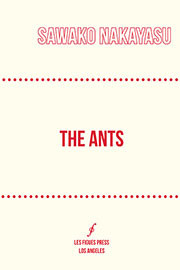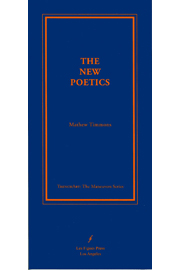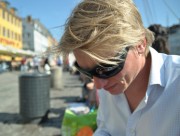The Field
Martin Glaz Serup
A Poem
Translated by Christopher Sand-Iversen
Cover artwork by Lise Harlev
Poetry | $15.00
ISBN 13: 1-934254-23-3
Size: 5.8125” X 7.875
Pages: 94
Binding: Softcover, Perfect
BUY NOW at LARB BOOKS
“The field is a lot. It wants its life to be honest and true and surprising. But how. The field doesn’t know.”
What, or who, is The Field? Martin Glaz Serup calls it “everybody’s autobiography” and Joanna Drucker calls it a “cosmology of banalities.” Cia Rinne says it “could be any average person living in a western society,” while Dmitry Golynko says “maybe the field equals the inner mapping of human psychic activity.”
The Field is place and character, poem and contemporary novel. The book’s text first existed as installations in art galleries in Copenhagen and Los Angeles. First released in 2010 in book form, the original Danish title–Marken—quickly sold out of its first printing, and the Finnish translation—Kenttä—will be released later this year. Is The Field on its way to becoming an international phenomenon? The Field is, after all, the perfect space and persona for readers’ self-projections, old and new.
Les Figues Press is proud to release the English-translation of The Field, perfectly bound in book form. This is The Field and it’s all about you.
Praise for The Field
“Almost all of the short texts in The Field start with “The field.” In Danish, “Marken” almost sounds like its author, Martin, and this Marken, the field, could be any average person living in a western society. Martin Glaz Serup rather comically introduces the reader to the field’s thoughts, doubts and questions, alternating between the serious and the profane, which makes The Field a lively little collection of contemplation on life in a western society.”
– Cia Rinne, poet
“_The Field_ wants to speak, to pretend to identity, play at agency. But what does The Field have to say? Oh, nothing much. Turns out to have the same complaints and concerns as the rest of us. HereThe Field is at once an emergent phenomenon, the expression of contemporary ordinariness, and also an oddly affectless zone of banalities. The irony and wit of the flat statements shift the tone from existential to playful, wry, droll, and quirkily complacent even with all its self-reflections and unease.”
– Johanna Drucker, poet
“For me, the field—as the pivotal hero of Martin Glaz Serup’s poem—is the eloquent question mark pointing toward the unrecognizability of contemporary man’s inner-self. The field is sensitive and sentimental, rational and whimsical, it ‘hates dogs’ and ‘doesn’t like liver, no matter where it comes from, neither raw nor grilled.’ The field is a social network user spending ‘far too much time on Facebook’ and besides the field is a self- challenging political subject (‘The field can’t imagine anything outside of capitalism, the field can’t imagine capitalism’). The Field reveals that we can get back to our true inner-self only by getting out of ourselves—a sudden understanding ‘how it feels to be unfit’ in the real world.”
– Dmitry Golynko, poet
“The Field revolves entirely around a measly shifting trick: in a series of sentences flatly describing the triviality of daily life, the third-person pronoun is replaced with the gender-neutral designation “the field.” This designation works as a name which is not even quite a name, slightly depersonalizing the action of each sentence while individualizing this very depersonalization. That is, the poem is unique in the way it depersonalizes, suggesting that the collectivity inherent in the sheer banality of our daily activity, consisting both of minor movements and a general affective wash, does not merely deprive us of selfhood, but always uniquely deprives us of selfhood, thus constituting the self, as and in the field. In this light, the very measliness of its essential trick is _The Field_’s greatest accomplishment: by shifting the sentences ever so slightly, Serup marks the slightness of being a person, doing all those slight things a slight person does.”
– Steven Zultanski, poet
“Serup [crafts] a text that both moves at the speed of Twitter, page by page, quip by quip, but also builds like a novel, like a piece of music, dependent upon a lengthy engagement, focus.”
A review from Burrow Press Review
Featured on the Best of the Small Press 2011 list
Listed on the Best Book of Poetry 2011 longlist by 3:AM Magazine
A review by Geof Huth at dbqp: visualizing poetics
An interview with Martin Glaz Serup by 3:AM Magazine

